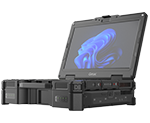- SOLUTIONS
-
PRODUCTS
-
INDUSTRIES
-
-
-
Defense
Mission-critical COTS computing that delivers high powered processing and reliability in operational environments.
-
Public Safety
Ambulance, Fire & Rescue and Policing applications
-
Utilities
Smart Meter Reading and Installation, On-site Safety, Utility Asset Management, Workforce Management for Utilities, Mobile GIS, Surveying and Mapping
-
Transportation & Logistics
Railroad Management, Airport Management, Port Management, Long-haul Delivery Fleet Management, Warehouse Materials Handling
-
Industrial Manufacturing
Industrial Programming and Robotic Control, Facility management, Compliance and Inspections, Workforce Management, Inventory and Warehouse Management, Factory Automation and Plant Monitoring, EAM and CMMS Solutions.
-
Automotive
Optimized Rugged Mobile Solutions to drive a smarter approach throughout the automotive value-chain.
-
Natural Resources
Mining, Forestry and Construction applications
-
Oil & Gas
Remote Support, Asset Management, Field Data Analysis, Workplace Safety
-
- Explore All Industries
-
-
-
COMPANY
-
HELP & SUPPORT
- RESOURCE CENTER
- |
-
- Americas
-
Europe
-
-
- Hungary (English)
- Ireland (English)
- Italy (Italiano)
- Kazakhstan (Русский)
- Kyrgyzstan (Русский)
- Latvia (English)
- Lithuania (English)
- Mongolia (English)
- Netherlands (English)
- Netherlands (Nederlands)
- Norway (English)
- Poland (English)
- Poland (Polski)
- Portugal (English)
- Portugal (Português)
- Romania (English)
-
- Asia Pacific
- Middle East & Africa


























